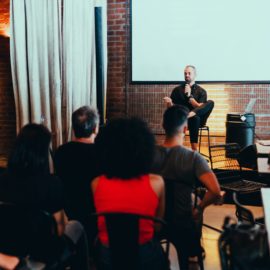
Is our relationship with reading fundamentally changing as we move from traditional to digital formats? What does this shift mean for our cognitive abilities and future intellectual development?
Reading in the digital age represents a significant transformation in how our brains process information. Cognitive neuroscientist Maryanne Wolf explains that our current shift to digital reading is rewiring our neural pathways in ways that bring both opportunities and risks.
Keep reading to discover how screens are changing not just what we read but how we think—and what we can do to preserve the valuable cognitive skills traditional reading has given us.
Reading in the Digital Age
The brain evolved over millennia to read and write, and each of us becomes literate over many years. But literacy is at risk, Wolf says. The nature of reading in the digital age has changed—and it’s changing our brains, too.
To illustrate the nature of this shift from written to digital literacy, Wolf calls back to ancient Greece. When the Greek alphabet began to spread, Socrates argued that reading and writing would weaken the distinct cognitive skills that oral culture encouraged. He thought that dead words on a page couldn’t support proper thinking and the pursuit of knowledge as well as live oral communication did.
In other words, Socrates felt that literacy would change the way people thought. Though he focused on the potential negatives, he had the right idea: What we do changes the brain (neuroplasticity), so different ways of using language develop different abilities in us.
(Shortform note: In Understanding Media, Marshall McLuhan makes a similar argument about how information formats affect us. He writes that different forms of media influence our beliefs and attitudes—shaping how we think, feel, and act on a pre-conscious level. Writing around the time mass media first arose (mainly as television and radio), McLuhan says that “the medium is the message:” The way you receive information can be more important than the information itself. For instance, you’d experience a banquet scene differently if you saw it in an online ad versus a movie. You’d be more indifferent to the scene in the ad, whereas you’d be more emotionally involved in the movie scene.)
While Socrates was right that literacy would bring changes, he didn’t foresee its upsides. According to Wolf, literacy allowed humankind to develop a whole new range of cognitive skills. No longer needing to memorize everything we might want to think about, we could go beyond the thoughts we’d been able to think before. Studies show that writing things down frees your mind up to think further ahead. This increased cognitive freedom gave us time to think more deeply, more critically, and more empathetically. It gave rise to the traditions of literature, scholarship, and intellectual rigor that we carry on today.
Our brains will change again as we shift from traditional reading and writing to digital, online reading and writing. And Wolf writes that, if we mismanage this shift, we could lose the rich inheritance of thinking skills that traditional literacy gave us.
(Shortform note: How we think and communicate affects not just our brains but our cultures, too. In oral cultures, knowledge is fluid, communal, and performative—preserved through epic poems, storytelling, and communal memory. When literacy developed and some cultures moved away from oral traditions, people pursued knowledge in a more personal manner, such as by doing their own reading and writing. This contributed to individualism in these cultures. In our shift to digital culture, we’re changing again to become both highly individualized and highly interconnected. We each live in a world of personal, algorithmic information feeds that shape us—and also tap us into cultural niches and movements we might never have found otherwise.)
Positives & Negatives of Screen Reading
How will the digital age change our brains and our thinking skills? Wolf isn’t quite sure, but she writes about both potential upsides and downsides.
Discussing upsides, Wolf writes that digital reading could promote strong associative thinking—the ability to make connections across many topics or themes. She also says that digital mediums offer accessibility features, such as adjustable text size, read-aloud options, customized learning support, and interactive engagement with texts—things not possible with an inert, physical book.
(Shortform note: Digital reading isn’t the only way to cultivate associative thinking. In Mastery, Robert Greene argues that, although we tend to become more rigid in our thinking as we age, we can practice to stay mentally limber. He recommends allowing for uncertainty and stimulating chance associations by embracing downtime—for instance, you might take a long walk to get some time alone with your thoughts. Used alongside accessibility features such as those Wolf mentions above, these practices can help you stay sharp as you read online.)
Despite these potential upsides, Wolf worries that digital reading could have major downsides. Because the internet lets you quickly scan and bounce among many different streams of information, it conditions you to think in a different way. Moving swiftly from article to article or tweet to tweet, you take things in less deeply but more broadly. Able to access most any piece of information almost immediately, you don’t stop as long to think or engage as critically with it.
(Shortform note: Where does the densely connected structure of the internet come from? It has its origins in the ideas of Ted Nelson and other early computing pioneers. In his 1965 paper “Complex Information Processing,” Nelson describes “hypertext,” or computer documents connected by what he called “hyperlinks,” those blue links we’re all familiar with. Nelson and others envisioned the internet as a nearly utopian technology, but it’s had unforeseen consequences. One, as Wolf says, is that when we multitask online—interacting with multiple pages or elements on a page—we divide our attention and don’t absorb information as deeply. In this way, internet use can diminish your critical thinking skills.)
Given that the internet encourages you to skim and bounce around quickly, Wolf says it might have these negative effects:
- Decreased attention span (trouble sticking with one thing, such as a book)
- Less capacity for analytical thinking—it becomes harder to think critically about the ideas in a text. For instance, you might struggle to understand an author’s argument (about, say, the merits of veganism), assess its soundness, and decide whether you agree.
- Less empathy—it gets harder to take other perspectives, relate deeply to an author’s ideas, and pick up on the meaning and emotion in what you read.
These skills are precisely those that humankind developed through traditional literacy. To preserve them, we have to make sure we don’t abandon deeper, slower, offline reading and writing altogether.
(Shortform note: Some research suggests Wolf’s concerns are well-founded. One study found that human attention spans have dropped from 12 seconds in 2000 to just 8.25 seconds, or shorter than a goldfish’s. Another shows that young people are neither thinking critically nor reading for pleasure as much as they used to. Lastly, some experts had begun arguing as early as 2011 that the internet is reducing our empathy for one another—though other research finds that some forms of internet use, such as social networking, can increase empathy.)






